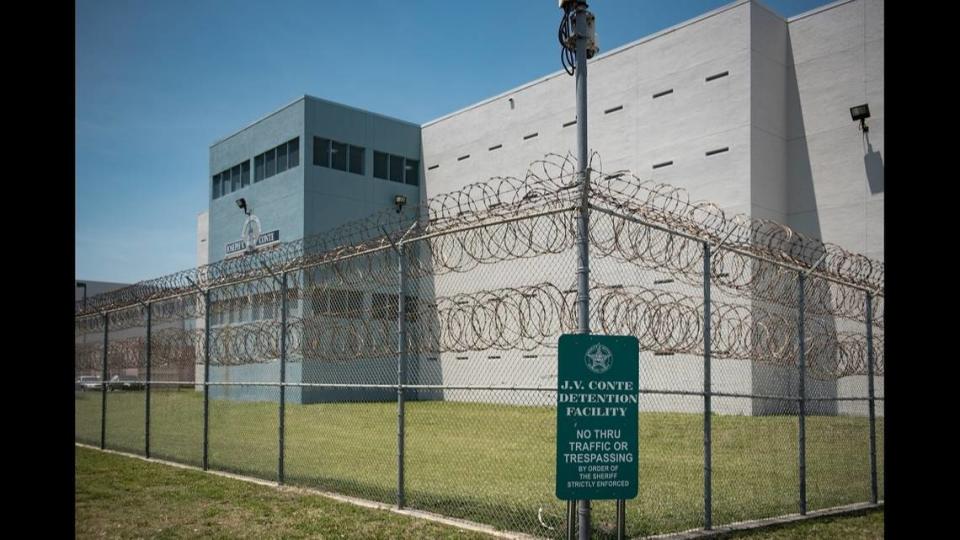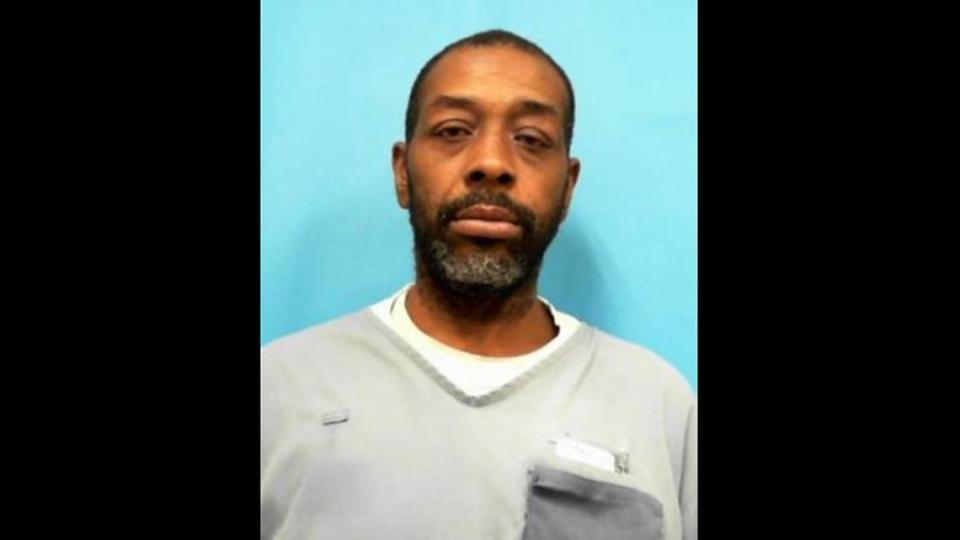‘I almost died in there’: As winter peak recedes, jails still struggle with COVID, lawsuits
Alan Pollock was arrested last March 16 for violating probation. He waited in the North Broward jail to appear at his next hearing.
Pollock never made it.
He died on April 7 at the Northwest Medical Center where he was hospitalized after testing positive for COVID-19 while in custody.
In a time of COVID, even as cases are falling and vaccines are being administered to some behind bars, Pollock’s case showed how a stint in custody — even a brief one, in a jail where the majority of detainees have not been tried or adjudicated guilty of anything — can become a death sentence. Pollock’s case is included in a series of criticisms and accusations of mistreatment aimed at the Broward Sheriff’s Office, which runs the jails in Broward County.
Complaints prompted a class-action lawsuit by the American Civil Liberties Union, which has resulted in a settlement not quite finalized because of the multi-phased procedure for completing such litigation. Provisions, some of them already implemented, include expanded COVID testing, rules barring COVID-negative detainees from being housed with positive detainees, and giving medically vulnerable detainees twice-daily temperature checks.
Despite an easing of restrictions statewide amid an ebb in the number and percentage of Floridians testing positive since the winter spike, dread and uncertainty continue inside the walls of Broward jails. Detainees fear for their health as the incarcerated population, deliberately thinned out during the worst throes of the pandemic, fills out anew. Maintaining personal space is a challenge when uniformed officers are in charge of your movements, sleeping and living arrangements.
In the year since COVID struck, the Broward jail system has had 378 detainees and 323 staffers test positive.
The Miami-Dade Department of Corrections has had more cases and was less forthcoming with data. After numerous requests for information over more than a week, spokesman Juan Diasgranados said the jail would not provide the cumulative number of positive tests for detainees or staff, even though the facility is responsible for providing the healthcare of those it detains. Diasgranados would say only that the current tally of active cases is 30 detainees and 64 staff. Diasgranados said “less than five” detainees have died of COVID, but would not provide a specific count.
The Herald obtained more specific information from a different agency: Jackson Health System. The county’s public hospital network, serving the poor and the incarcerated, among others, said Miami-Dade jails have had 1,864 detainees and 846 staffers test positive since the virus manifested itself. Jackson placed the death count at three.
Diasgranados said high case counts in the early stage of the virus were due to a “proactive” approach to testing asymptomatic detainees. Broward, in contrast, has apparently not focused testing on detainees without symptoms.
A prior Herald story identified two of the dead in Miami-Dade as 77-year-old Nelson Martinez and 51-year-old Charles Hobbes Jr.
Pollock, the Broward detainee who died in April, was a registered sex offender, a frequent arrestee. He was detained for failing to report address changes and triggering his ankle monitor, which he wore as a condition of his freedom. He had faced serious allegations in the past, including charges of child molestation and indecent exposure, although there is no record of an Alan Pollock in the Florida prison system, where most of the state’s worst sex offenders end up serving long stays.

Pollock’s lawyers filed an emergency motion on March 19 — 18 days before his death — seeking his release out of concern for his health and safety. The court dismissed the motion due to his prior history.
COVID sparked a concerted effort among Broward judges and attorneys for the state and defendants to facilitate the release of certain detainees held on minor charges. Around the time of Pollock’s death, the first from COVID in the Broward jail system, the county’s population dropped to the lowest level in decades, below 3,000, said Veda Coleman-Wright, BSO’s public information office director. The population has since risen to as high as 3,460 inmates, according to data released by BSO.
Broward Chief Judge Jack Tuter said a factor fueling the higher number of detainees is the reopening of businesses, leading to more crime and more arrests. Hearings for reduced bonds and emergency release of inmates due to COVID-19 risks are ongoing.
“We have been working at this tirelessly, like everybody else,” Tuter said. “Everybody started doing this to see how they can reduce the population with the potential of COVID being spread.”
As of March 10 the Broward jail population consisted of 92.1% of detainees awaiting trial, according to data from BSO. The chief judge said a majority of inmates are there on some type of a felony, either on no bond due to violating their probation or they are waiting for jury trials, which were halted by the pandemic.
The ACLU of Florida lawsuit, co-filed by Disability Rights Florida Inc., highlighted that individuals held in jails before trial have more constitutional rights than those convicted of crimes and are subject to “reasonably safe conditions of confinement” and treatment for medical needs.
“The vast majority of people here are being held before a conviction,” Anjana Samant, a senior staff attorney with the ACLU, said. “Almost all are pretrial.”
Samant said the COVID-19 Hotline for Incarcerated People, an advocacy group for people in South Florida jails, connected the ACLU with detainees who had complaints about conditions and the containment of COVID-19 in Broward jails. Media coverage also prompted concern for the safety of detainees.
The class-action suit, filed on behalf of current and future detainees, led to a settlement agreement with BSO outlining terms that must be followed to keep the incarcerated safe through the ongoing pandemic.
Terrance Lynch, general counsel for the Broward Sheriff’s Office, wrote in a statement that Sheriff Gregory Tony directed BSO’s Department of Detention to institute measures to contain the spread of the virus and protect detainees’ and staff’s health before the lawsuit was filed.
The settlement is currently in a phase where jail detainees can raise objections if they don’t agree that the terms are fair. A judge will make a decision on whether to make the settlement a court order in a May 10 hearing.
Gary Lindley, a detainee at the Paul Rein Detention Center, hopes the settlement will promote more transparency between Broward jails and the public.
“As far as the COVID, they’re failing miserably,” Lindley said. “And they’re not telling the public anything about it.”
[49-1] Broward jail settlement by Casey Frank on Scribd
The 34-year-old was arrested on Aug. 23, 2017, on charges that he sexually assaulted a minor. He said he is in one of the few COVID-free dorms in the detention center.
Lindley said the medical negligence in the jail is “rampant.” Detainees with medical conditions are at the mercy of health staff, receiving medications depending on the nurses’ shift, and getting medication doses late is common.
Broward jails’ medical care came under scrutiny in October when a detainee with mental illness gave birth in her cell alone after receiving no medical attention.
Lindley said one of the biggest contributors for virus-spread in jails are “shakedowns” — searches of dayrooms, cells, showers and detainees themselves that are conducted on a random basis to ensure the incarcerated are not in possession of unauthorized items.
Gerdy St. Louis, a BSO spokeswoman, wrote in an email that during shakedowns jail staff are equipped with personal protection equipment and tape markers outline six-foot increments where detainees are required to line up during searches.
But Lindley said that with all of the detainees out in the recreation yard at the same time during shakedowns, social distancing becomes impossible.
“This is not a safe place to be during this virus,” Lindley said.
As of March 10 about 13.5% of all tested detainees have tested positive, according to data released by the Broward Sheriff’s Office.
A second detainee, Michael Byrd, died of COVID-19 on Sept. 20 at the North Broward Bureau.
Byrd, 66, was transported to Broward Health North after testing positive for the virus on Sept. 6. He was treated for 12 days before being transferred back to the jail, where he died hours later, according to BSO.
In May, Miami-Dade corrections faced a similar lawsuit involving a group called Dream Defenders. The county successful reduced the population of its jails by hundreds by opting not to detain those arrested on minor, nonviolent offenses.
The state prison system has its own ongoing struggle with the virus. The Florida Department of Corrections reports 17,907 inmates have tested positive and 210 had died from the virus as of March 10, according to the FDC website. Unlike jail detainees, prison inmates have been convicted of crimes.

Ricardo Olmedo describes the nights he spent in the Broward County Main Jail, where Broward’s COVID-19 positive detainees are transferred in order to better isolate them, as the worst experience of his life. Olmedo said detainees scream through the night, some begging for a Tylenol.
“What they are doing is inhumane,” Olmedo said.
Olmedo was arrested on Sept. 9, 2019, on felony charges of Medicaid fraud, trafficking prescription drugs and money laundering after he turned himself in at the Main Jail. He was kept at the Joseph V. Conte Facility in Pompano Beach.
On Nov. 25, Olmedo tested positive for COVID-19 after being exposed by another detainee but received little to no treatment, according to a Dec. 1 court filing asking that he be released. In the filing, his lawyer wrote that neglecting to treat the 57-year-old, who suffers from asthma, was “cruel and unusual punishment.”
On Dec. 15, a judge granted Olmedo’s release to await trial on house arrest.
Although no longer in custody, Olmedo now lives with lingering effects in his lungs. The former detainee said doctors told him it will take a while to fully recover because he did not get the appropriate medical attention in time.
“I almost died in there,” Olmedo said.

